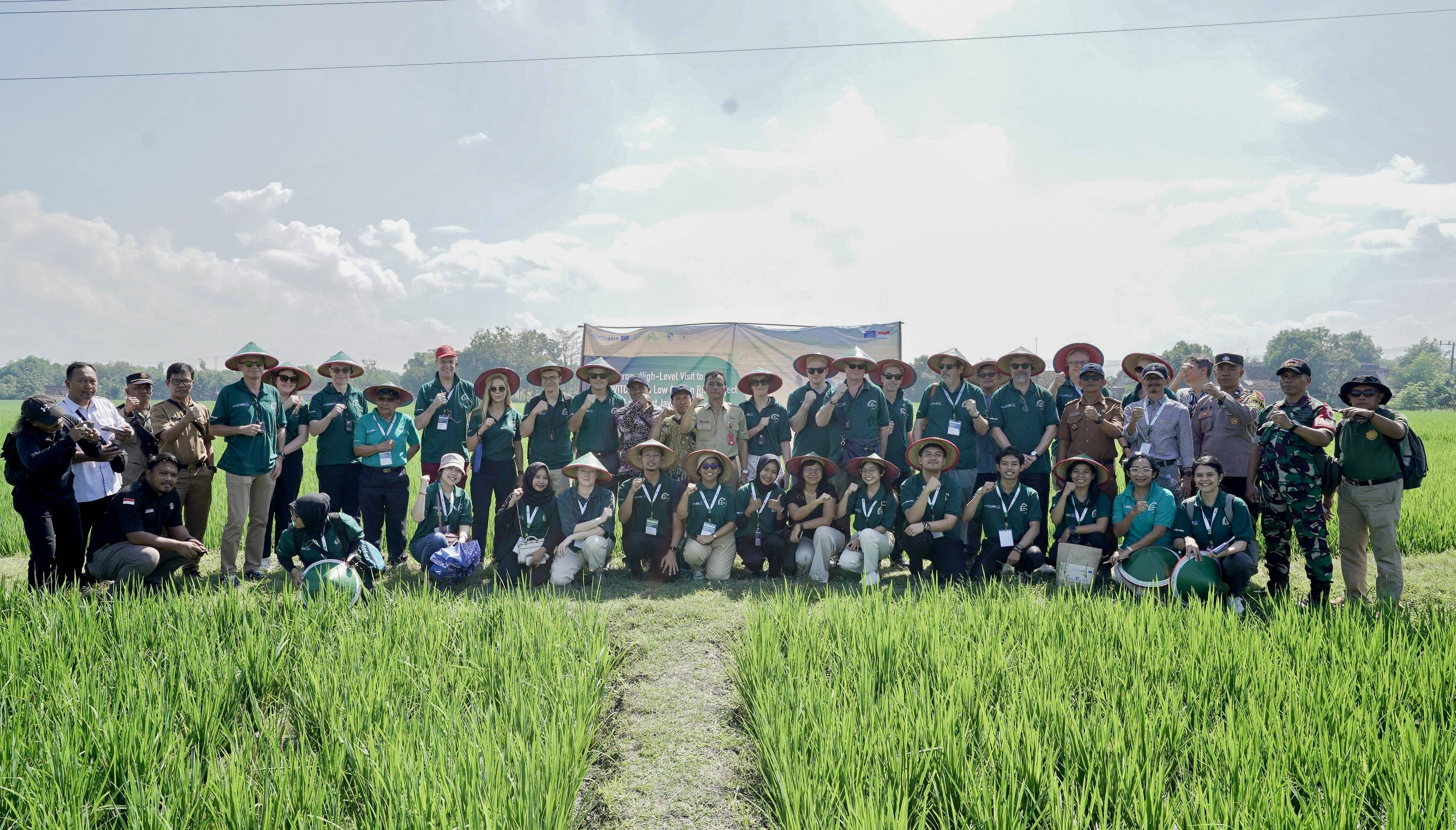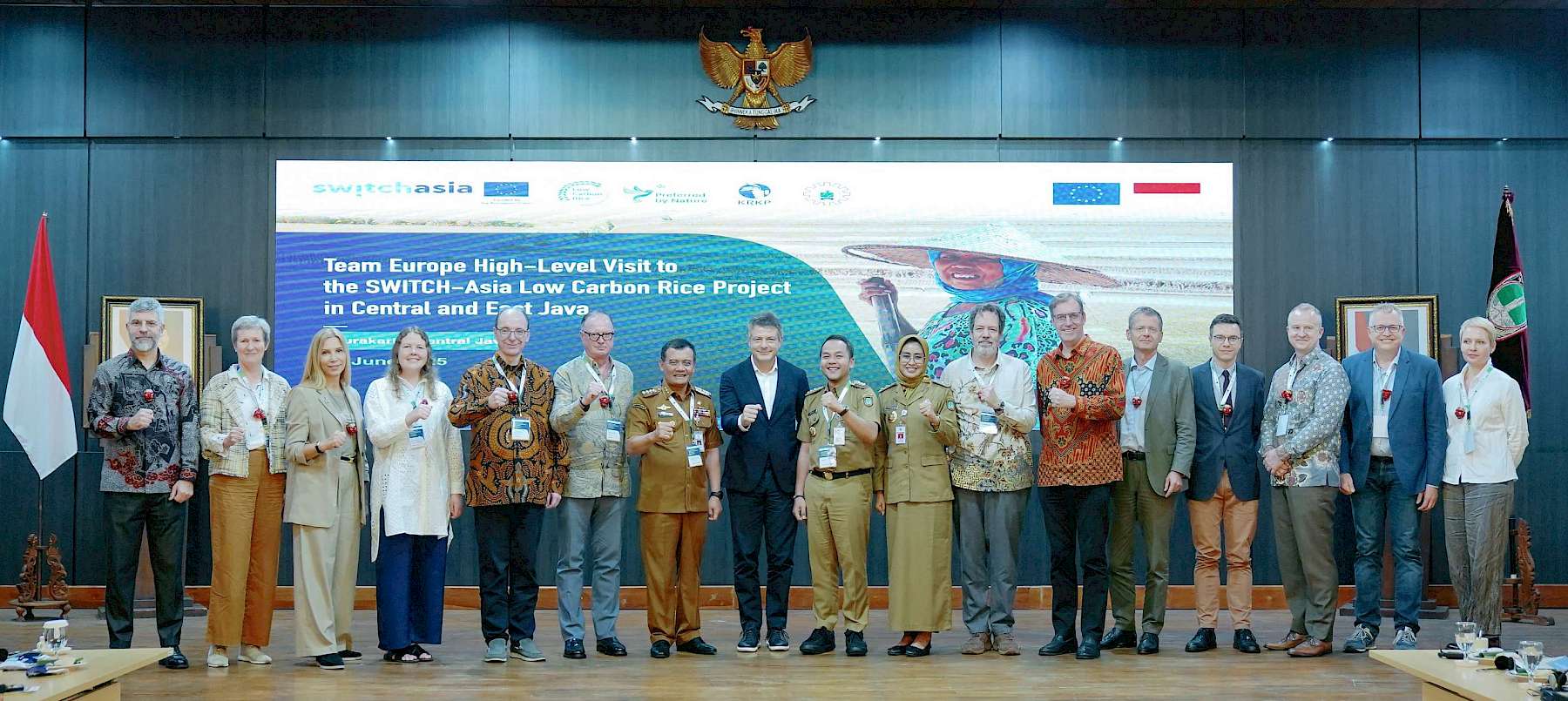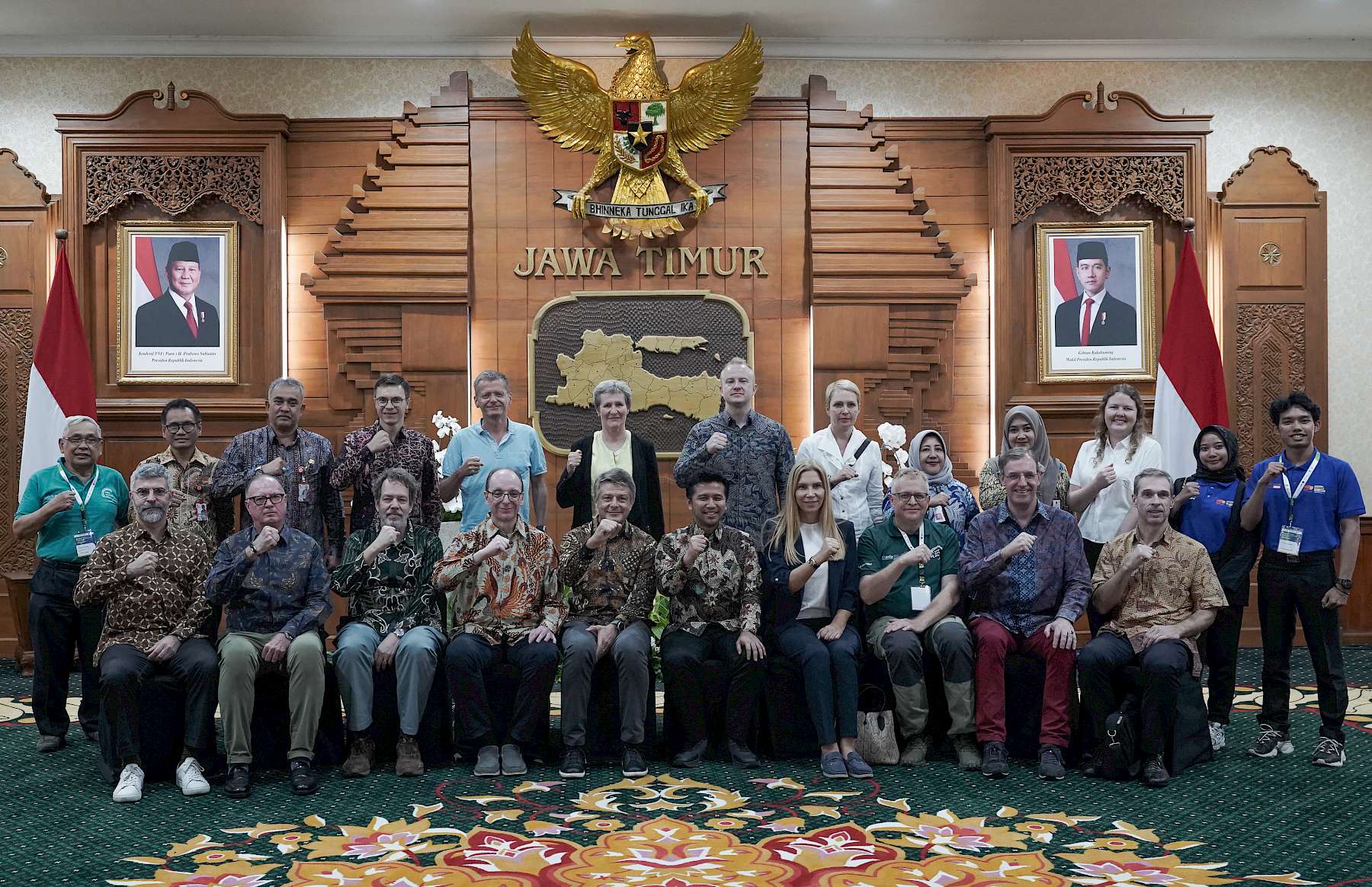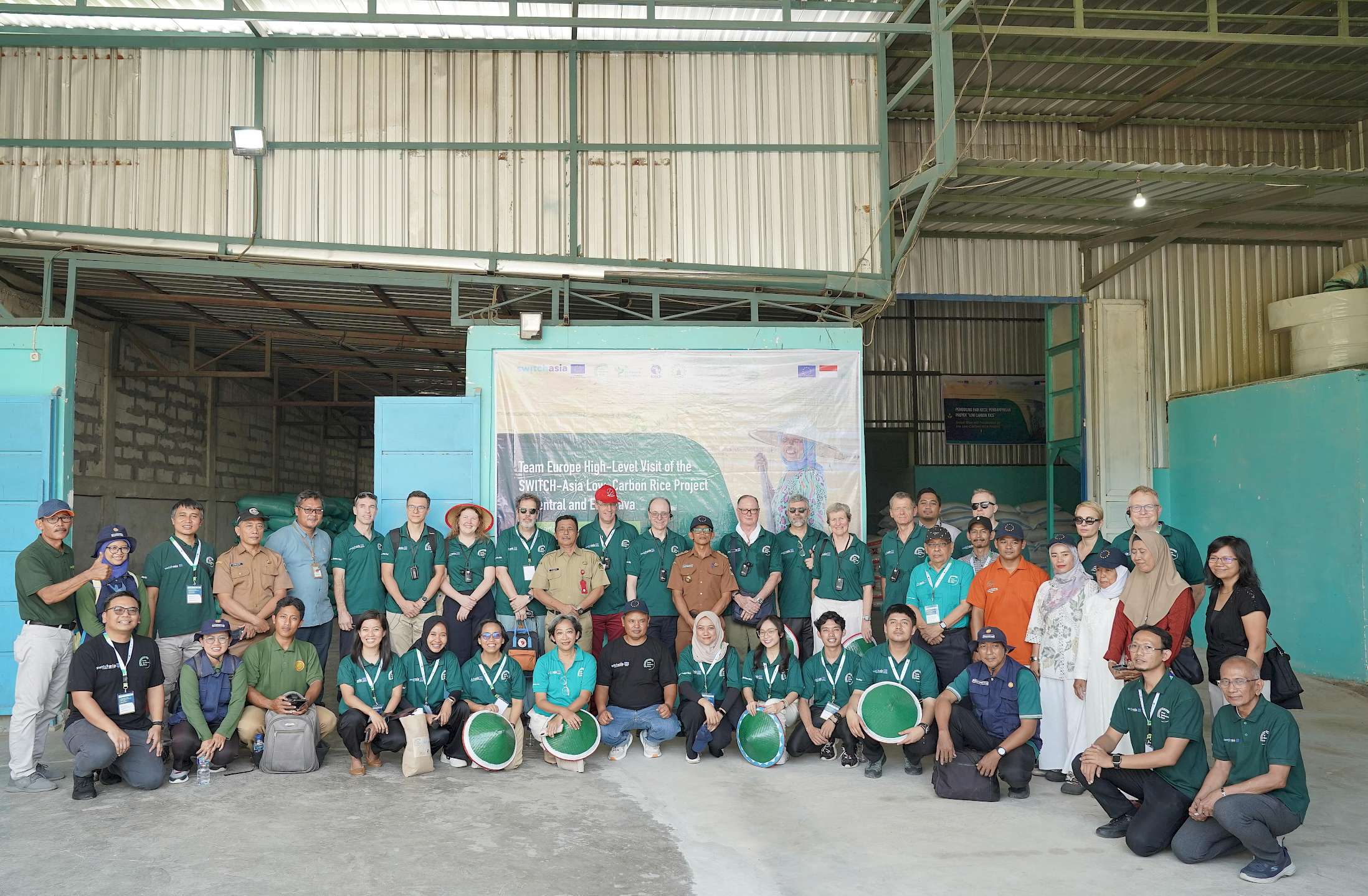
Team Europe – comprising the Delegation of the European Union (EU) and 12 EU Member States – recently concluded a visit to Central and East Java to strengthen cooperation on sustainable agriculture under the EU-funded SWITCH-Asia Low Carbon Rice Project. The visiting Team Europe included ambassadors and representatives from the EU, Belgium, Bulgaria, Denmark, Germany, Spain, Cyprus, Lithuania, Netherlands, Austria, Poland, Finland and Sweden.
The visit began in the city of Surakarta on 30 June, where Team Europe met with the Governor of Central Java, Komjen Pol (P) Drs Ahmad Luthfi, and the Mayor of Surakarta, Respati Ardi, to discuss progress and future collaboration on low-emission rice production. The visit continued on 1 July to Madiun regency, where Team Europe engaged with smallholder farmers and local millers, and concluded in the city of Surabaya with discussions with the Vice Governor of East Java, Emil Elestianto Dardak.
Supporting Climate Action and Rural Economies
The SWITCH-Asia Low Carbon Rice Project – implemented by Preferred by Nature, in partnership with the Indonesian Rice Millers and Traders Association (PERPADI) and the People’s Coalition for Food Sovereignty (KRKP) – supports smallholder farmers and has provided assistance to 150 small rice mills across Central and East Java. By introducing cleaner post-harvest technologies – particularly the transition from diesel to electric milling – the project aims to reduce carbon emissions at the mill level while lowering costs and improving smallholder livelihoods.
This cooperation with Indonesia aligns with the EU Global Gateway strategy, which focuses on infrastructure investment and creating an enabling environment in the agri-food sector as one of the key sectors to tackle global challenges on food security and sustainability.
This project is a prime example of how climate action and economic development can go hand in hand. In Central Java, we are seeing the real impact of sustainable innovation – lower emissions, stronger rural economies and better cooperation between Europe and Indonesia. The SWITCH-Asia Programme demonstrates our commitment to sustainable partnerships that benefit people and the planet alike, said H.E Denis Chaibi, EU Ambassador to Indonesia.
Strategic Regional Collaboration
Central Java plays a key role in the project. Districts such as Klaten, Sragen, and Boyolali have already seen pilot rice mills switching to energy-efficient practices, improving local value chains and contributing to national climate goals.
Central Java is one of the largest provinces with a population of 37 million people spread across 36 regencies and cities. Additionally, Central Java is the second-largest rice producer in Indonesia, accounting for 18% of the country's rice demand. In Central Java, there are various National Strategic Projects (PSN) and we invite domestic and foreign investment in food self-sufficiency, green economy and tourism. Central Java's economy is very healthy and we will help oversee the licensing process and provide tax incentives for green economy projects, said Komjen Pol (P) Drs Ahmad Luthfi, Governor of Central Java.
Surakarta, which hosted the meeting, is positioning itself as a hub for green governance and inclusive development.
We believe that the development of low-carbon agriculture, as promoted by the SWITCH-Asia Low Carbon Rice project, is very much in line with the vision of Surakarta in creating a sustainable agricultural ecosystem. An approach that is not only environmentally friendly but also based on community empowerment and technological innovation is a strategic step in addressing the challenges of climate change and food crisis. Through this meeting, we hope to exchange views, strengthen collaboration and boost the role of Surakarta in global cooperation networks, especially in the agenda of food system transformation and climate change adaptation, said Respati Ardi, Mayor of Surakarta.
Driving Sustainable Practices at the Local Level
In Madiun, Team Europe was joined by the Madiun Regent, H. Hari Wuryanto, to witness firsthand the positive results of the SWITCH-Asia Low-Carbon Rice Project. Smallholders and farmers in Klumutan Village, one of the project's pilot locations, shared their experiences in adapting to the new system and reported improvements in energy efficiency, rice yields and market access.
“By partnering with local governments like Madiun and working directly with small rice millers, we are building greener, more resilient food systems that benefit both people and the planet. It is inspiring to see how sustainable innovation is already improving rice quality and smallholder livelihoods here in Klumutan village,” said H.E. Denis Chaibi, EU Ambassador to Indonesia.
The SWITCH-Asia project brings important hope and momentum for the farmers in Madiun regency to familiarise and adopt low-emission agricultural technologies and practices. We welcome the collaboration between the European Union, Preferred by Nature, PERPADI and KRKP in assisting farmers and rice millers to implement greener and more efficient rice production methods. We believe this kind of international support not only strengthens local capacity but also paves the way to a global market that increasingly emphasises sustainability, said H. Hari Wuryanto, Madiun Regent.
In Surabaya, Team Europe concluded their visit with discussions with Vice Governor Emil Dardak, focusing on the achievements and future potential of the SWITCH-Asia Low Carbon Rice Project in supporting East Java’s transition toward environmentally responsible and low-carbon rice production.
The SWITCH-Asia Low Carbon Rice Project represents our shared vision of sustainable development that delivers tangible results. By working with East Java’s farmers, millers and local authorities, we are building greener value chains, advancing food security and creating economic opportunities – all while reducing the carbon footprint of one of Indonesia’s most vital crops. The EU is proud to support this transformation, said H.E. Denis Chaibi, EU Ambassador to Indonesia.
East Java province is the second largest contributor to the Indonesian economy, and is the largest producer of rice in the country. More than one-sixth of Indonesia’s GDP originates from East Java, and the province contributes approximately 25% of the nation's manufacturing output. While East Java stands as a manufacturing hub, the province is also known as the highest producer of agricultural commodities in Indonesia.
Maintaining a balance between these two different sectors is not always easy. Therefore, we support initiatives such as this project to implement low-carbon and more environmentally friendly harvesting and post-harvesting methods. The East Java Provincial Government welcomes the innovation and technology of agricultural practices resulting from this collaboration that can reduce carbon emissions without compromising food security and the farmers’ welfare, said Emil Elestianto Dardak, Vice Governor of East Java.


---------
About Preferred by Nature
Preferred by Nature is an international non-profit supporting better land management and business practices that benefit people, nature, and climate. For 30 years, Preferred by Nature has developed sustainable solutions for land management-related supply chains in 100+ countries, focusing on forestry, agriculture, and travel. Collaborating with key landscapes, supply chains, and markets, Preferred by Nature targets positive change for a healthier environment, climate, and sustainable livelihoods.
About People’s Coalition for Food Sovereignty
The People's Coalition for Food Sovereignty (KRKP) is an organisation founded in February 2003 in Bogor, Indonesia. KRKP focuses on fulfilling food sovereignty and supporting farmers as the main subjects in food development. KRKP defines food sovereignty as the right of every person to access and control productive resources and determine their food production, distribution, and consumption policies.
About the Indonesian Rice Miller and Trader Association (PERPADI)
The Indonesian Rice Miller and Trader Association (PERPADI) is an organisation that represents the interests of rice millers and traders in Indonesia. By representing the interests of rice millers and traders, PERPADI plays a crucial role in shaping the rice industry in Indonesia.
This article was prepared by the Press and Information team of the Delegation to INDONESIA and BRUNEI DARUSSALAM. The original article can be accessed here.



